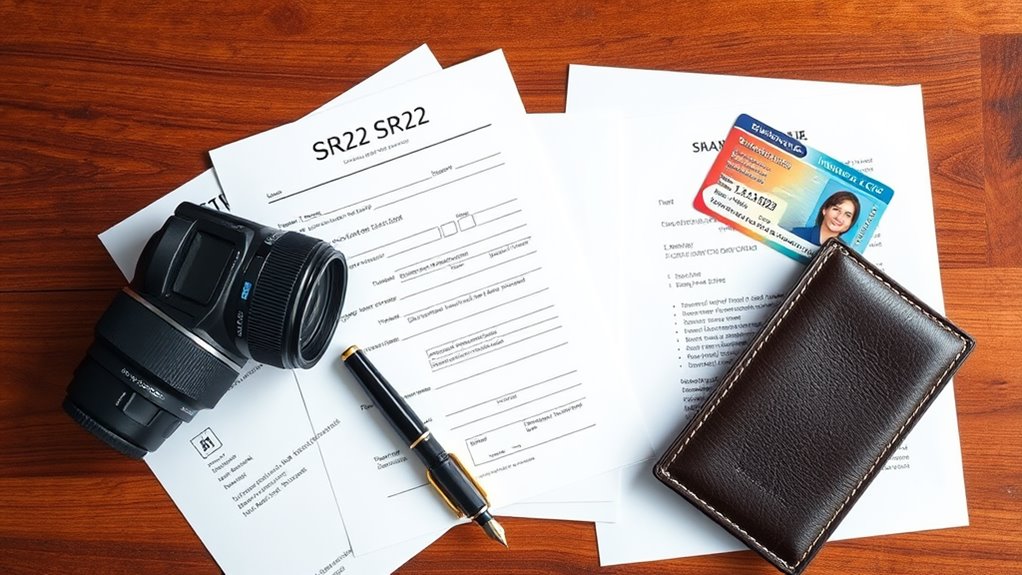
Understanding the nuances of state laws impacting SR-22 insurance coverage is essential for any driver seeking to navigate high-risk situations. Each state presents unique requirements and implications that influence your insurance premiums and financial responsibilities. For instance, California's stringent liability coverage mandates can greatly affect costs. By exploring these laws, you'll uncover how compliance can impact your driving privileges and insurance options moving forward. What specific regulations should you be aware of in your state?
Key Takeaways
- California mandates SR-22 for three to five years, requiring minimum liability of $15,000 bodily injury and $5,000 property damage.
- Texas enforces SR-22 with higher minimums of $30,000 bodily injury and $25,000 property damage to avoid license suspension.
- Florida requires SR-22 for DUI offenses and uninsured accidents, with minimum liability of $10,000 bodily injury and $10,000 property damage.
- Virginia's FR-44 alternative mandates higher coverage of $100,000 bodily injury per person, specifically for DUI convictions.
- Maryland emphasizes continuous coverage standards without SR-22, with minimum liability of $30,000 bodily injury and $15,000 property damage.
California's SR-22 Requirements and Premium Implications

California's SR-22 requirements, it's vital to understand both the mandated coverage and the financial implications that come with it.
California requires minimum liability coverage of $15,000 for bodily injury per person, $30,000 per accident, and $5,000 for property damage. While these are the baseline amounts, higher limits may apply in certain cases. Additionally, California's laws surrounding SR-22 insurance can be complex and vary based on individual circumstances.
You'll typically need to maintain SR-22 insurance for three to five years, depending on your violation's severity, such as DUIs or reckless driving. Continuous coverage during this period is crucial, as any lapse can lead to penalties like license suspension.
The premiums for SR-22 insurance are generally higher due to the high-risk nature of the drivers involved. It's important to compare rates across different insurers, as premium costs can vary considerably based on your driving history and the specifics of your violation.
Texas Minimum Coverage Laws for High-Risk Drivers
California's SR-22 requirements highlight the importance of understanding state-specific regulations, particularly as you move to Texas, where minimum coverage laws for high-risk drivers come into play.
Understanding SR-22 requirements is crucial when transitioning from California to Texas, especially for high-risk drivers.
If you're categorized as a high-risk driver, here are key coverage requirements you need to know:
- Bodily Injury Liability: $30,000 per person, $60,000 per accident.
- Property Damage Liability: Minimum of $25,000 for damages to others' property.
- Personal Injury Protection: Optional coverage of $2,500 through TAIPA.
- Uninsured/Underinsured Motorist Coverage: Available at minimum liability limits.
As a high-risk driver, maintaining your SR-22 for the mandated period is essential to avoid license suspension.
Understanding these laws can help you navigate your insurance options effectively.
Florida's Specific SR-22 Regulations and Coverage Amounts
Understanding Florida's specific SR-22 regulations is vital for drivers facing heightened scrutiny due to traffic violations or other infractions.
In Florida, an SR-22 certificate is mandatory for those with DUI convictions, multiple traffic violations, or uninsured accidents. The Florida DMV notifies you when you must file, and your insurance company handles the filing process, typically for a fee ranging from $15 to $25.
The state mandates minimum liability coverage of $10,000 for bodily injury per person, $20,000 per accident, and $10,000 for property damage. For serious offenses, higher coverage limits may apply.
Continuous coverage is essential during the required period, usually three years, as lapses can result in penalties and further complications.
Maryland's Liability Insurance Standards Without SR-22

Although many states require SR-22 forms for high-risk drivers, Maryland sets itself apart by not mandating this documentation, focusing instead on its minimum liability insurance standards.
Maryland distinguishes itself by not requiring SR-22 forms, instead prioritizing minimum liability insurance requirements.
Here's what you need to know:
- Maryland requires $30,000 bodily injury per person, $60,000 per accident, and $15,000 for property damage.
- Continuous coverage is mandatory; any lapse can incur penalties.
- Drivers can waive Personal Injury Protection (PIP) in writing.
- In certain cases, FR-19 forms serve as proof of financial responsibility.
Massachusetts and Its Unique SR-22 Stance
Massachusetts presents a distinctive approach to SR-22 insurance, as it doesn't require this form for drivers, even those with serious violations.
Instead, you must adhere to the state's minimum insurance requirements, which include $20,000 for bodily injury per person, $40,000 per accident, and $5,000 for property damage.
Although SR-22 isn't mandated, serious offenses like DUI can still impact your insurance premiums due to perceived risk.
It's essential to maintain continuous coverage to avoid penalties, including potential license suspension.
If you move to a state that requires SR-22 after a Massachusetts violation, you may need to file it there.
Understanding these nuances can help you navigate your insurance needs effectively and avoid complications.
Virginia's FR-44: An Alternative to SR-22
In Virginia, the FR-44 serves as a critical alternative to the more commonly known SR-22, specifically designed for drivers who've been convicted of DUI offenses.
Here are some key points to contemplate:
- Higher Coverage: FR-44 requires a minimum of $100,000 bodily injury per person and $200,000 per accident.
- Filing Requirement: Your insurance company must file the FR-44 with the Virginia DMV.
- Duration: You need to maintain this coverage for three consecutive years post-conviction.
- Cost Implications: Expect considerably higher premiums due to the elevated coverage levels.
Understanding the differences between FR-44 and SR-22 can help you navigate your insurance needs effectively, ensuring compliance while managing costs.
Alabama's Filing Periods for SR-22 Insurance

When maneuvering Alabama's SR-22 insurance requirements, understanding the filing periods can considerably impact your compliance and financial planning.
Typically, you must maintain your SR-22 for a minimum of three years following a qualifying violation, such as a DUI or driving without insurance. If you have multiple offenses, that period may extend.
It's vital to renew your SR-22 at least 15 days before expiration to avoid license suspension. The filing period starts from the date of your violation or conviction, making timely compliance essential.
Continuous coverage is mandatory; failing to maintain your SR-22 could result in penalties, including reinstatement fees ranging from $200 to $400 based on the offense type.
Staying informed about these requirements keeps you on the right side of the law.
Arkansas' Indefinite SR-22 Requirements for Repeat Offenses
Although Arkansas typically requires drivers to maintain an SR-22 for three years following certain violations, repeat offenders face indefinite SR-22 requirements that can greatly complicate their driving status.
If you find yourself in this situation, consider the following:
- Continuous Coverage: You must maintain uninterrupted SR-22 coverage to avoid additional penalties.
- Increased Costs: Expect higher insurance premiums, averaging around $2,299 annually due to your history.
- Reinstatement Challenges: Failing to comply can lead to the suspension of your driving privileges.
- Court Mandates: Additional conditions may be imposed, complicating your path to reinstatement.
Understanding these factors is essential for managing your driving record and financial obligations effectively.
Tennessee's Three-Year SR-22 Filing Norms
Tennessee's SR-22 filing norms present a structured approach to ensuring drivers maintain financial responsibility following certain driving offenses.
Typically, you'll need to maintain your SR-22 for three years after a significant violation, such as DUI or reckless driving. During this period, you'll be required to hold a minimum liability insurance of 25/50/15, as mandated by state law.
The SR-22 form must be filed by a licensed insurance company, and you can expect to pay a filing fee between $15 and $35. If you fail to maintain this coverage, your license may be suspended.
It's essential to stay compliant, as any additional infractions could extend your SR-22 requirement beyond three years, complicating your insurance landscape.
The Impact of State Penalties on SR-22 Compliance
State penalties greatly influence SR-22 compliance, impacting both the legal and financial landscapes for drivers. Understanding these penalties is essential for maintaining compliance.
Here's how they affect you:
- License Suspension: Non-compliance can lead to losing your driving privileges, varying by state.
- Fines and Fees: States impose significant fines, adding to the burden of maintaining SR-22 coverage.
- Increased Insurance Rates: Compliance often results in higher premiums due to perceived high risk.
- Continuous Coverage Requirement: You must maintain uninterrupted insurance to avoid penalties and guarantee compliance.
Being aware of these factors can help you navigate the complexities of SR-22 insurance and mitigate potential legal and financial repercussions.
Conclusion
Maneuvering SR-22 insurance laws can feel like steering through a complex maze. Just like a driver must carefully navigate to avoid dead ends, understanding state-specific requirements helps you maintain compliance and avoid costly penalties. Whether you're in California with its robust liability mandates or Texas with its minimum coverage laws, staying informed is key. Ultimately, being proactive about your SR-22 needs can save you from unexpected twists and turns in your insurance journey.